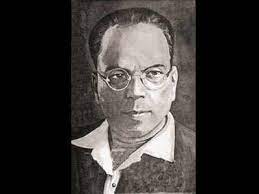Raghunath Dhondo Karve is known as a staunch supporter of individual liberty and freedom. He believed in individual autonomy and attempted to normalize non-procreative sexuality. He challenged existing customs and argued for individual sexual freedom and awareness through his publication समाजस्वास्थ्य (Health of the society).
“Our communities and countries can flourish only when every individual has the power to make decisions about their bodies and to chart their own futures” – Natalia Kanem (Director, UNFPA)
Raghunath Dhondo Karve is largely known as the son of the social reformer Maharshi Karve, who worked for the cause of women’s education, widow remarriage and women’s welfare. Raghunath Karve often tends to be overshadowed by the work and the personality of his father. However, Raghunath Karve (henceforth Karve) has a noteworthy and tumultuous legacy that remains relevant today. A scholar of Mathematics, Karve attained the Diplome d’Etudes Superieures from Paris. He went on to teach at Wilson College in Mumbai till 1925 when he was forced to resign. This event foreshadowed the difficult journey that lay ahead for Karve.
Karve was a strong believer in individual autonomy especially of the corporeal kind and was a strong supporter of birth control. At a time when the hush-hush of taboo prevailed over the articulation of information, Karve wrote extensively on matters such as legalizing prostitution, imparting sex education and creating greater awareness among men and women alike. Recognising the necessity to communicate with people in an accessible language and the need to acquaint people with Western writings, Karve wrote almost exclusively in Marathi. He wrote संततीनियमन : आचार आणि विचार (Family Planning : Thoughts and Action) in 1923, आधुनिक कामशास्त्र (Modern Kamshastra) in 1934, आधुनिक आहारशास्त्र (Modern Science of Diet) in 1938 among several others. As part of his initiative to impart sex education, Karve started a monthly called समाजस्वास्थ्य (Health of the society) where he offered an intellectual opposition to the then extant institution of marriage and attempted to normalize non-procreative sexuality, which also included homosexuality. The editorial of the first edition highlights Karve’s aims – “व्यक्तींच्या व समाजाच्या शारीरिक व मानसिक आरोग्याची व त्यासंबंधी उपायांची चर्चा करणे हा या मासिकाचा उद्देश आहे. विशेषतः ज्या विषयासंबंधी लेख इतर पत्रकार छापत नाहीत असे विषय कितीही महत्त्वाचे असले तरी त्यासंबंधी माहिती मिळवण्यास सामान्य वाचकांस अतिशय अडचण पडते. ही अडचण दूर करण्याचा आमचा विचार आहे. यात तत्त्वज्ञानाचा खल न करता व्यवहारोपयोगी माहितीही दिली जाईल” (र.धों. कर्वे यांचे समाजस्वास्थ्य, 2022)
(The aim of this magazine is to discuss and elaborate on the physical and mental health of individuals and the society as a whole. Specifically, a lot of important topics are not covered by several journalists making it difficult for the reader to find information. We plan to resolve this difficulty faced by the readers. Without getting into philosophical deliberations, this magazine will provide information on such topics along with information on other practical considerations).
Karve spoke and wrote in support of sexual liberation from the dictates of customs, morality and the law, for both men and women. He criticized the customary labels of ‘virtue’ and ‘chastity’ and suggested that each individual must have the opportunity to liberate themselves. He opposed the then existing system of marriage which according to him allowed women’s bodies to be treated as property. It is important to note that Karve’s support for birth control did not come from the view of distribution of national resources or allowing the state to take control of family planning. In fact, in one of his pieces titled कायदे करणाऱ्यांची अक्कल (Karve, 1931) (The Intelligence of the Lawmakers), Karve refers to English and French laws on selling tools that help prevent transmission of STDs and on selling contraceptives (both of which, as Karve points out, not only overlapped but were more or less the same). He points out the sheer pointlessness of state action where each country, England and France allowed the sale of one but prohibited that of the other. Karve ends the short piece by mocking the lawmakers and by lamenting the takeover of personal liberty by the state. Karve’s support for birth control came with a view to enable women to exercise autonomy over their body and their sexuality. He firmly believed that sexual freedom was a right that must be available to every adult irrespective of their gender, orientation, place in society among others. The monthly magazine समाजस्वास्थ्य also featured write-ups and correspondences supporting homosexuality and transgender individuals.
In his writings, Karve often made allusions to the societies of ancient India to remind his readers of the freedom enjoyed by their ancestors and the shackles brought on by Victorian morality. Karve investigates Kautilya’s approach towards prostitution and the nature of prostitution during the times of Vatsayana and he compares that with the modern legislation on prostitution. He believed very strongly that the state must not prohibit prostitution. In वेश्यांसंबंधी कायदे (Laws on Prostitution), he offers evidence from across Europe to show that prohibition of prostitution had disastrous effects on society (Karve, 1931). In another piece, titled वेश्यावृत्तीचा हक्क (Right to prostitution), Karve reiterates the argument made in a magazine called ‘The New Freeman’. He suggests that choosing prostitution as a means of livelihood is a right enjoyed by adult citizens; as long as all parties involved offer their consent, the state cannot and must not interfere (1931).
Needless to say, Karve’s writings attracted a severe backlash from several sections of the society. Following the resignation from Wilson College in 1925, Karve faced two major lawsuits. He was arrested on charges of indecency in 1931 on the orders of the government of Bombay Presidency. His appeal was turned down in the High Court and he was charged a fine of Rs. 100 . In the Gujarati edition of समाजस्वास्थ्य, while answering readers’ queries, Karve wrote on homosexuality. His responses brought him another lawsuit and he was once again arrested in February 1934 (BBC News मराठी, 2022). Dr. Babasaheb Ambedkar took up his case and represented him in court. Dr. Ambedkar raised pertinent questions about censorship, freedom of speech and expression, and individual freedom. Justice Indravadan Mehta stated that there was no need for Karve to publish readers’ questions if they were filled with perversion. Dr. Ambedkar stated in response that if there was indeed perversion among the readers, then the only way to dispel that was through awareness, education, and information. Dr. Ambedkar offered evidence from the works of Havelock Ellis to argue that homosexuality was not a vice nor a sin; hence writing about it could not be considered a crime. Dr. Ambedkar stated that Karve had exercised his right to freedom of speech and expression; what offended a particular section of society could not become grounds for curtailing Karve’s right to free speech. Despite the brilliant arguments, Karve lost the case and was fined Rs. 200.
The setback and the storm of criticism didn’t stop Karve and he continued writing in समाजस्वास्थ्य. He continued voicing his support for sex education and sexual liberation for men and women alike. Karve found it difficult to make ends meet. Karve often printed the magazine with pictures of naked men and women to normalize the human body. Due to the nude pictures on the cover and the often controversial content inside, many middle-class men hesitated to bring copies of समाजस्वास्थ्य into their homes (Botre & Haynes, 2017, p.10). Subscriptions were low, amounting to 250 in the early 1930s and reaching only 700 in 1952. Due to low subscriptions and legal troubles, Karve struggled financially throughout his life. Although his ideas never fully found acceptance, they influenced generations to come. Armed with nothing but the desire to create awareness and a strong commitment to individual liberty, bodily autonomy for women, and the right to choose, Karve published समाजस्वास्थ्य till his death in October 1952. The one-man-led initiative to make sex education available and make sexual liberation possible was captured in the Marathi movie titled Dhyasparva (2001) and in the Marathi play Samaj Swasthya (2017).
References
BBC News मराठी. (2022, October 14). र. धों. कर्वेः डॉ. बाबासाहेब आंबेडकर जेव्हा ’समाजस्वास्थ्य’साठीचा खटला हरूनही जिंकले होते. BBC News मराठी. https://www.bbc.com/marathi/india-42236452
Botre, S., & Haynes, D. E. (2017). Sexual Knowledge, Sexual Anxieties: Middle-class males in western India and the correspondence in Samaj Swasthya, 1927–53. Modern Asian Studies, 51(4), 991–1034. https://doi.org/10.1017/s0026749x16000184
Karve, R. D. (Ed.). (1931). समाजस्वास्थ्य मासिकातील निवडक लेख [Print]. र. धों. कर्वे राईट एजन्सी.
र.धों. कर्वे यांचे समाजस्वास्थ्य. (2022, June 20) https://radhonkarve.com/


